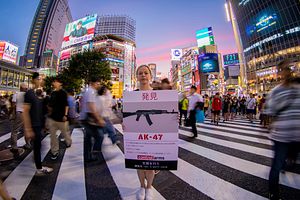Japan has said it wants to persuade more countries to join the Arms Trade Treaty (ATT) to prevent the “devastating human suffering” caused by the illicit sale of conventional weapons. Japanese Foreign Minister Taro Kono vowed to press for universalization of the ATT, as he opened the 4th Conference of States Parties in Tokyo on Monday.
The five-day conference is considering how to deal with numerous challenges facing the treaty, including a lack of participation among Asian countries. The ATT now has 95 States Parties – or about half of UN member states – but they include just 12 percent of countries in Asia. In the East Asia subgrouping, Japan and South Korea are the the only countries to have ratified it.
Asia should therefore be seen as the ATT’s “next frontier,” according to a report published on the sidelines of the conference by Control Arms, a civil society campaign movement. The ATT Monitor Report 2018 argued uptake in Asia was hampered by a combination of political caution, ambitious industrial policy goals, and lack of trust in a process that was perceived as biased in favor of traditional arms-exporting countries.
Japan, which was heavily involved in the ATT rule-making process, has signaled it intends to play a leadership role in this respect. Earlier this year, Japan pledged $3 million to the ATT’s voluntary trust fund, part of which was earmarked for universalization efforts in the region, the monitor report noted.
“The unregulated or illicit trade of conventional weapons has caused devastating human suffering and regional instability, which undermines social and economic development,” Kono told the conference. The minister argued the ATT now faced two imminent challenges: universalization and effective implementation. He added: “To continue to increase the number of States Parties, we should work together to promote the value and role of ATT.”
The ATT, which was adopted in 2013 and entered into force the following year, aims to establish “the highest possible common international standards” for regulating the international trade in conventional arms and preventing their illicit trade. These arms include battle tanks, armored combat vehicles, large-caliber artillery systems, combat aircraft, attack helicopters, warships, missiles and missile launchers, and small arms and light weapons.
The treaty imposes a range of record-keeping and reporting obligations. An exporting country, for example, must assess the potential that the arms could facilitate a serious violation of international humanitarian or human rights law, among other criteria. Exporters may consider whether confidence-building measures or other joint steps could mitigate the risks. Importers must supply appropriate and relevant information to enable such assessments.
Transfers are prohibited if they breach UN arms embargoes, or if the seller has knowledge at the time of authorization “that the arms or items would be used in the commission of genocide, crimes against humanity, grave breaches of the Geneva Conventions of 1949, attacks directed against civilian objects or civilians protected as such, or other war crimes as defined by international agreements to which it is a Party.”
The opening speeches at the conference in Tokyo were dominated by messages about the need for the ATT to be implemented faithfully.
Helen Durham, the head of law and policy for the International Committee of the Red Cross, raised concern about a “growing gap between states’ absolute commitments to human rights and international humanitarian law – in the treaty and elsewhere – and how arms are transferred in practice.”
Durham cited figures from the Stockholm International Peace Research Institute indicating a 10 percent increase in the volume of international transfers of major weapons in 2013-17 compared with the period 2008-12. She argued the states gathered at the conference had “a vital role to play” by upholding international humanitarian law and acting responsibly at every step along the arms transfer chain. “That way, you can prevent the devastating and irreparable harm that comes when weapons fall into the wrong hands.”
Shobha Pradhan Shrestha, who addressed the conference as a representative of Control Arms, called on states to live up to their commitments, work to prevent the diversion of weapons that end up in the illicit trade, and improve transparency and reporting.
Shrestha pointed to the suffering in Yemen, including the recent bombing of a school bus that killed 40 children. She vowed to keep campaigning to stop arms transfers to all warring parties in Yemen. “Control Arms welcomes the actions of those governments who have stopped transfers to the Saudi-led Coalition,” Shrestha said. “But there are governments, including ATT States Parties, who are still supplying weapons, and violating the ATT. An American bomb destroyed the school bus. And it could have just as easily been a British bomb.”
Anja Kaspersen, the director of the Geneva branch of the UN Office for Disarmament Affairs, also mentioned the Asia-Pacific’s low level of participation in the ATT as “an issue that requires attention.” She told the conference: “It should be noted that this low level of participation correlates poorly with the fact that some subregions in Asia account for the highest annual growth in arms import. Special efforts also need to be made to promote participation in the treaty of the largest actors in the arms market.”
Kaspersen conceded: “Clearly we have a long way to go until the treaty reaches the level of adherence necessary for it to function as an effective global regime.”

































